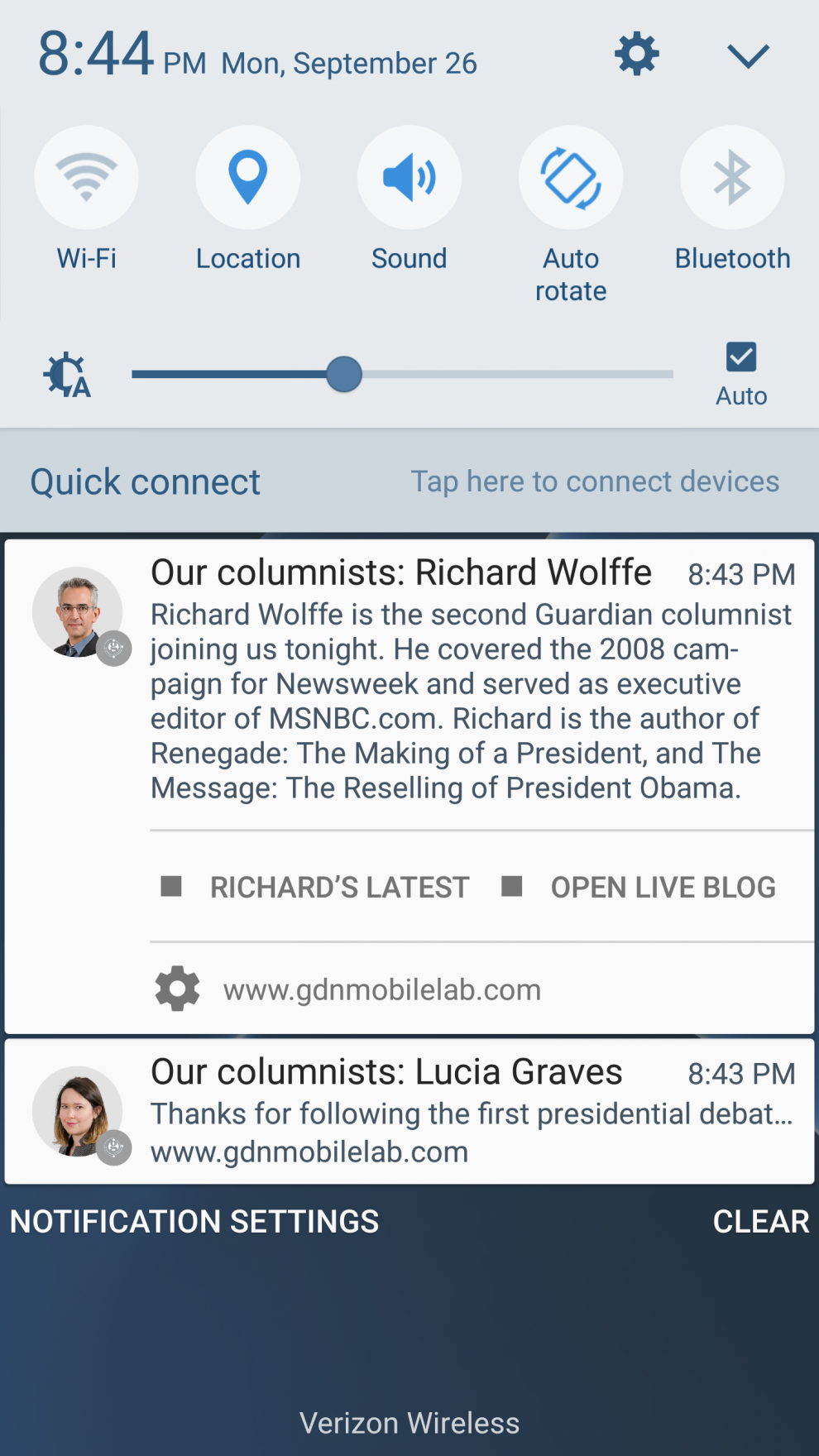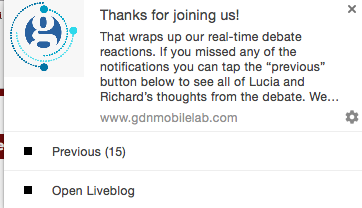
 Who won the first 2016 presidential debate? The answer still depends on who you ask, but The Guardian’s Mobile Innovation Lab sent a handful of sizzling takes from Guardian U.S. Opinion desk columnists Lucia Graves and Richard Wolffe to guide debate watchers through Monday night’s faceoff, all in the form of notifications (Android only at the moment, or through the Chrome browser on desktop).
Who won the first 2016 presidential debate? The answer still depends on who you ask, but The Guardian’s Mobile Innovation Lab sent a handful of sizzling takes from Guardian U.S. Opinion desk columnists Lucia Graves and Richard Wolffe to guide debate watchers through Monday night’s faceoff, all in the form of notifications (Android only at the moment, or through the Chrome browser on desktop).
The columnists followed along with the debate and sent their reactions to opinion editor David Shariatmadari via Gchat, who loaded up their comments into a mini-CMS custom-built by Mobile Lab developer Connor Jennings and pushed out the commentary directly from there, reducing some friction between writer and the final notification.
“It was the columnists’ first time doing something like this, so was a little bit of an experiment for them as well, and I think getting a feel for the appropriate length and speed of reaction was something that we were figuring out, in real time,” Shariatmadari said. “One of the things we wanted to know was, what is the natural rhythm and pacing, what is the natural register, for these kinds of notifications? It’s not going to be quite the same as live tweeting, but there’s a level of informality to it that brings it a little closer to live tweeting. The experience from last night made that slightly more clear.”
 Last night’s alerts were intended to supplement regular breaking news alerts from the Guardian app: “By any rational measure, Clinton won this debate hands down. The only question is whether voters are in a rational mood,” one alert read. Those following along could tap (or click) through to see the string of previous alerts (there were 15 total). The notifications have a strict character limit (and line breaks count), so the language of these notifications needed to walk the line between scannable and sufficiently standalone.
Last night’s alerts were intended to supplement regular breaking news alerts from the Guardian app: “By any rational measure, Clinton won this debate hands down. The only question is whether voters are in a rational mood,” one alert read. Those following along could tap (or click) through to see the string of previous alerts (there were 15 total). The notifications have a strict character limit (and line breaks count), so the language of these notifications needed to walk the line between scannable and sufficiently standalone.
By the end of the night, 629 total users were signed up to the experiment, the bulk of users (242) signing up the day of the debate.
Real-time commentary in the form of notifications is the latest in a string of experiments run by the Guardian lab, which has tested everything from auto-updating interactive push alerts to quizzes embedded within push notifications. (Disclosure: Knight, a funder of the Guardian’s Mobile Lab, is also a supporter of Nieman Lab.)
“We saw the debate as a good event to do something that was more qualitative,” Sasha Koren, Mobile Lab editor, said. “We wanted to gauge whether or not notifications are a good space for opinion on this kind of live event, to see whether users would take to them, but also to figure out how it would be to work with David and the other writers, to integrate further into the newsroom.”
Survey responses from users who signed up for the experiment are still rolling in, but the Mobile Lab team says it’s seen a few promising indications that users were materially following along with these notifications in real time: more users engaging with the alert than swiping to dismiss it, and users didn’t seem to be tapping/clicking back to more than one or two previous alerts.
This post has been updated to include numbers and experiment design details from the Mobile Lab team and some details from Guardian Opinion editor David Shariatmadari.
5 comments:
DxyjWUVB
MZafkUOV
TXPRvsCckwqOmLi
sdTvponeEJx
cyDrzTQjfONqn
Trackbacks:
Leave a comment